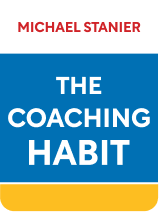

This article is an excerpt from the Shortform book guide to "The Coaching Habit" by Michael Bungay Stanier. Shortform has the world's best summaries and analyses of books you should be reading.
Like this article? Sign up for a free trial here .
Do you want to know how to build a habit? What practical steps can you take?
The book The Coaching Habit discusses how to build a habit in three steps. Whether it’s a coaching habit or any other habit, this practical system can help you do new and different things to move forward personally and professionally.
Keep reading to learn how to build a habit.
How to Build a Habit
For coaching to be truly effective, you need to turn it into something that you routinely do—a habit. It sounds simple, but building a habit can be a challenge. You only need to recall all your failed New Year’s resolutions to see how difficult it can be. Simply declaring that you’ll exercise more, that you’ll stop spending and start investing, or that you’ll start coaching isn’t enough to form a habit. Knowing how to build a habit is crucial. You need to approach it systematically in three steps:
1) Pinpoint Your Old Habit
You can’t get rid of an old habit if you don’t know what it is in the first place, so be clear and specific about the habit you’re trying to change.
- For example, you may have the bad habit of frequently stepping in and making decisions for your team members without letting them work through problems themselves.
2) Determine Your Triggers
Knowing how to build a habit involves understanding triggers. Once you have your old habit in mind, figure out what triggers it. There are five common types of triggers: location, time, emotional state, other people, and the immediately preceding action. Thinking in terms of these five categories may help you determine your triggers—once you realize what they are, you can more consciously stop yourself from engaging with them and performing your bad habits.
- For example, you may be triggered to make decisions when you feel impatient (emotional state), when you’re trying to get out of the office at the end of the day (time), or whenever you deal with a team member who has a reputation for being indecisive (other people).
3) Specify Your New Habit
Just as you’re clear and specific about the old habit you want to change, you need to identify the new habit that you want to form. In this case, you want to form the new habit of asking your team members one of the seven essential questions.
- For example, instead of stepping in to rescue an indecisive team member, your new habit might be to step back and ask her what’s on her mind or why making a decision is a challenge for her.
(Shortform note: For more on how to build a habit, read our guide to Charles Duhigg’s The Power of Habit. It covers identifying your triggers, breaking bad habits, and forming good habits.)
Build Up Good Coaching Habits With Practice
When starting your new coaching habit, or any habit for that matter, you’ll encounter a lot of challenges, so make it as easy as possible by practicing and mastering one part of the new habit at a time.
The best way to build up your confidence and consistency with your new coaching habits is to try them out on receptive team members, rather than those who may have been resistant to coaching in the past. Additionally, you can inform friends and colleagues of the new habits you’re trying to put in place and ask them to support you and help keep you accountable.
Most importantly, when you’re learning how to build a habit, remember that failure is inevitable and normal. Nobody perfects a habit on their first attempt. Keep trying, even if it takes a few tries.

———End of Preview———
Like what you just read? Read the rest of the world's best book summary and analysis of Michael Bungay Stanier's "The Coaching Habit" at Shortform .
Here's what you'll find in our full The Coaching Habit summary :
- How to turn coaching into an informal, effective daily habit
- Why you should practice listening instead of speaking for 10 minutes a day
- The seven essential questions to ask your team members






